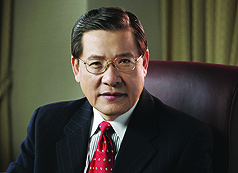Economists: Trade with Asia, steer clear of Europe

Economist Sung Won Sohn of CSU Channel Islands. (courtesy file photo).
Steer clear of struggling Western economies and look to thriving Eastern markets. That was the advice from economist Sung Won Sohn to local business leaders at an Oct. 20 event in Santa Barbara.
Sohn, a former Wells Fargo economist who now heads the Institute for Global Economic Research at CSU Channel Islands in Camarillo, and San Francisco Federal Reserve Bank economist Gary Zimmerman delivered one of the first forecasts of the new institute.
The CSUCI center was launched in April and aims to foster business ties between the Tri-Counties and Southern California and the rest of the world. “We want to build a bridge between the region and the Pacific Rim,” Sohn told the Business Times earlier this year.
Thursday’s event was hosted by The Bank of Santa Barbara and the Santa Barbara Region Chamber of Commerce.
Zimmerman noted that the Fed recently made drastic downward revisions to its economic figures for the first half of 2011. “The recession is actually deeper and the recovery is actually slower [than we expected],” he said.
GDP hasn’t recovered to 2007 levels, despite population growth, he said. Unemployment is still at 9.1 percent, and is estimated at 16 percent when including discouraged workers who have left the workforce and the underemployed. In California, that alternative employment rate is estimated at around 25 percent.
Zimmerman said forecasters were thrown off guard by several shocks. The Japanese tsunami crisis temporarily disrupted world supply chains, and the continuing debt crisis in Europe has sent repeated jitters through U.S. equity markets. A spike in commodity and energy prices —in part due to Middle East unrest in the first half of the year — also tempered the recovery.
“The global economy is like a spiderweb,” Sohn said. “We, America, can no longer say we’re isolated.”
Expect continued fallout in Europe, he said. “It makes no sense to have Germany and Greece in the same bed,” he said. “It’s quite possible the Eurozone could break up.”
Sohn offered practical advice to tri-county businesses interested in expanding their borders:
• “Limit your exposure to Europe,” he said. Individuals should make sure their mutual funds aren’t investing in European banks. Equity investors will want to evaluate their portfolios for companies with heavy business exposure to Europe.
• “If you’re an exporter, you’ll want to diversify out.” Don’t just sell to Europe; find markets in China and Korea. India is “growing very, very nicely,” he said, but struggles with worse corruption than China, and its large IT industry sells largely to Europe and the U.S.
• “Asia is the place to produce, invest and sell,” he said.
Sohn pointed to Limoneira Co., the Santa Paula-based avocado and lemon grower, as one example. Almost a third of the company’s produce is sold overseas, and its fastest-growing market is China, he said. “This is an example of why we should expand our horizons well beyond Santa Barbara County and Ventura County,” he said.
China is experiencing economic growth of about 10 percent, while the U.S. and Japan stagnate at 1 percent. It is one of the fastest-growing markets for luxury goods – including German-made cars and higher quality food products – and the country is starting to focus on higher quality manufacturing. “Asia is not just about cheap goods anymore,” Sohn said.
Zimmerman, the Fed economist, said the central bank does expect to see slightly improved figures from the second half of 2011. Low interest rates, lower gas prices and the dissipation of the effects of the Japanese crisis will help, he said.
Even so, the Fed doesn’t expect to reach 2.5 percent GDP growth until late 2012, which means no immediate bounceback in hiring.








